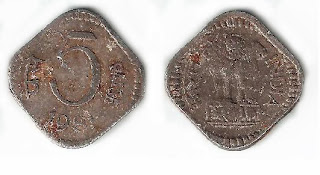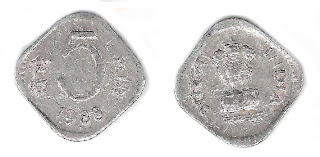5 paise
 |
| 5 paise 1981 |
India became independent on 15 August 1947 and was left with a legacy of non-decimal coinage. One rupee was divided into 16 annas or 64 pice, with each anna therefore equal to 4 pice. In 1957, India shifted to the decimal system, but for a short period both decimal and non-decimal coins were in circulation. To distinguish between the two pice, the coins minted between 1957 and 1964 have the legend "Naya Paisa" ("new" paisa). The denominations in circulation were 1, 2, 5, 10, 20, 25, 50 (naya)paise and one rupee which remained as the same pre-decimal value. Therefore pre-decimal coins of one, half and quarter rupees could remain in circulation after decimalisation.
Chronologically, the main considerations influencing the coinage policy of Republic of India over time have been: The incorporation of symbols of sovereignty and indigenous motifs on independence; Coinage Reforms with the introduction of the metric system; The need felt from time to time to obviate the possibility of the metallic value of coins rising beyond the face value; The cost-benefit of coinisation of currency notes.
The Ashok-Stambha (Ashoka's Pillar) is a motif on all Republic of India coins. The symbol is a representation of peace and non-violence.
Coin Description
5 Paise of 1981
Other Details
Year:
1981
Diameter:
22.00 mm
Shape:
Rounded-off square
Coin Condition:
OK
Remark:
-
 |
| 5 paise 1988 |
India became independent on 15 August 1947 and was left with a legacy of non-decimal coinage. One rupee was divided into 16 annas or 64 pice, with each anna therefore equal to 4 pice. In 1957, India shifted to the decimal system, but for a short period both decimal and non-decimal coins were in circulation. To distinguish between the two pice, the coins minted between 1957 and 1964 have the legend "Naya Paisa" ("new" paisa). The denominations in circulation were 1, 2, 5, 10, 20, 25, 50 (naya)paise and one rupee which remained as the same pre-decimal value. Therefore pre-decimal coins of one, half and quarter rupees could remain in circulation after decimalisation.
Chronologically, the main considerations influencing the coinage policy of Republic of India over time have been: The incorporation of symbols of sovereignty and indigenous motifs on independence; Coinage Reforms with the introduction of the metric system; The need felt from time to time to obviate the possibility of the metallic value of coins rising beyond the face value; The cost-benefit of coinisation of currency notes.
The Ashok-Stambha (Ashoka's Pillar) is a motif on all Republic of India coins. The symbol is a representation of peace and non-violence.
Coin Description
5 Paise of 1988
Other Details
Year:
1988
Diameter:
22.00 mm
Shape:
Rounded-off square
Coin Condition:
OK
Remark:
-

No comments:
Post a Comment